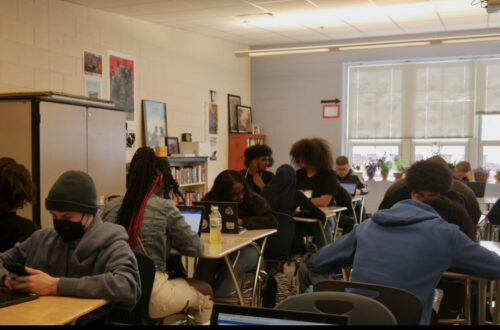Guy Cardwell
Editor
School Board student representative Emily Milton is an editor on Theogony but wasn’t involved in the writing of this article.
At a meeting on August 25, the Alexandria School Board discussed a controversial grading policy focused on addressing equity problems. The meeting came weeks late, and the proposed grading policy, which stated that homework should not be graded, NHI’s should be given instead of zeros and grades should generally reflect mastery of the curricula rather than completed work, showed a complete disconnect from teacher input.
The proposed grading policy fails to provide proper incentives for students to complete work and reflects a dangerous trend in School Board policy; to address equity, the School Board has reduced rigor and restricted teachers, despite the fact that these top-down approaches widen the equity gap at ACHS because they reduce the quality of instruction of non-Advanced Placement (AP) classes.
Looking back, this trend of focusing on equity at the expense of rigor was prevalent last year, when ACHS struggled to rebound from a year of online learning.
Despite the return to in-person, 2021 saw the continuation of some of the previous year’s grading policies put in place to help students adjust to online learning during COVID. Students could still turn in work up to two weeks late for full credit, and final exams only counted if they improved a student’s grade.
In the view of Christopher McGill, a history and government teacher, “Last year’s [late work] policy incentivized students not to do anything on time, which led to students having really poor attendance because they could make up everything. It was a huge burden on us teachers when several students would hand in nearly everything in the last few days of the quarter.”
Paradoxically, giving students more time to complete work led some to turn in assignments less often. With lax late policies, student organizational skills deteriorated and often students were completing assignments that the class curriculum had long past covered.
During the School Board meeting, grades were characterized as a “data point” to interpret students’ mastery of a subject. Yet, with a final exam that was treated as extra credit, students could dedicate zero effort on the final with no consequence, and important information about students’ understanding was lost.
Dr. Sharon Widmayer, a math teacher in the International Academy, said, “We had a large number of students last year who were not here for the entire school year. When we were trying to decide whether or not the student actually met the benchmarks to say they successfully completed the course, it was hard to do that since the final exam, in essence, didn’t really count. For me as a teacher, I need some way to say, ‘These students have mastered this many standards over the entire course.’”
As the 22-23 school year began, COVID-19-specific grading policies from the previous year had been removed, but the new grading policy had experienced delays; on August 25, nearly two weeks after school started, a special board meeting was held. No opportunity was given for public comment. Teachers had already distributed syllabi, often confusing students as to how they would be graded. As the proposed new grading policy was released before the meeting, teachers needed to be ready to completely adjust their curriculum in case of changes.
Laura Simons, a physics teacher who won the ACPS Teacher of the Year in 2018, expressed concern regarding the policy on Twitter.
“Hey @ACPSK12 I love you, but today was hard. I found out about our major grading policy changes in the middle of teaching a lesson. 3 days into the start of the year, and now I need to rework my entire course structure. I need to redo everything. I feel very small right now,” she wrote.
At the Board meeting, ACPS Policy Consultant Matt Smith introduced the grading policy. Smith argued that zeros should not generally be given because they don’t accurately reflect mastery of the content. “What does [a student not completing their work] tell us with their mastery of content? … Calculating any sort of a grade, be it a zero, fifty, or whatever, it is actually statistically invalid,” he said.
Smith also argued that the existence of graded homework is inequitable, saying, “Homework should be used as a formative assessment, but to be truly equitable, grading the part done outside of class is an equity issue.”
The problem is, grades were never designed to solely reflect mastery. Grades reflect a student’s study skills and participation, and they also provide a powerful incentive to turn in work. Study skills, such as doing homework, turning in assignments on time and being engaged during class, are equally important as an actual understanding of the material. Without incentives to develop these skills, students are ill-equipped for the workplace and college. The policy posited that “systematic supports” need to be put in place to address when students don’t turn in work, but it doesn’t give any insights as to what those are.
Gregory Derogatis, an economics and personal finance teacher, said, “Instead of bringing students that have challenges up, the standards of everyone else are being lowered. That’s going to cause challenges as they try to compete outside of school once they go to college or a situation where that level of flexibility doesn’t exist.”
Even if it were true that grades should reflect mastery, the proposed grading policy wouldn’t achieve such a goal, since classwork is typically only graded for completion, making up a large part of the formative assessment grading category.
On the issue of equity, removing homework would have the opposite effect as intended. The proposed policy would allow AP and Dual Enrollment (DE) classes to continue grading homework, increasing the gap in difficulty between core classes.
During the School Board meeting, student representative Emily Milton voiced similar concerns. She explained that students will not typically complete homework assignments that are not graded and criticized the focus on grading based on “mastery” since test-taking is a skill that not every student possesses. She also brought up the fact that one of the most influential programs towards allowing less privileged students to seek extra help, Lunch and Learn, has been removed.
School Board chair Megan Alderton however, didn’t address most points, instead focusing in on a particular phrasing from Milton which she took issue with. “We need to have multiple differentiated ways for our students to demonstrate their learning, and when I have a student say to me, ‘one test,’ we have a problem,” said Alderton. No examples of other ways to demonstrate mastery were discussed.
Ironically, Alderton, who sends her children to private school, questioned the qualifications of the student representative to speak on the issue of equity. “This is a student who has had some advantages. What is happening to kids who aren’t necessarily where Ms. Milton is because of the equity issues that we’re talking about. We have to do better,” she said.
Other School Board members, such as Tammy Ignacio, Kelly Carmichael Booz and Ashley Simpson Baird, expressed concerns about the proposed policy, which led to the grading policy being tabled for further discussion at a later date. Even so, the fact that the School Board even discussed implementing a grading policy which was nearly universally opposed by teachers well into the start of the school year poses questions to legitimacy of the School Board and gives insight into the chaotic nature of decision-making on the Board. Stripping away rigor in classes isn’t a realistic solution to equity problems; the School Board needs to act in the interests of the teachers and students which it represents.
Photo Courtesy of ACPS Express






